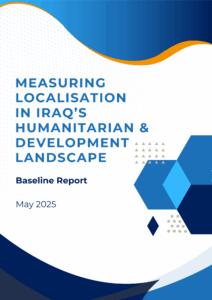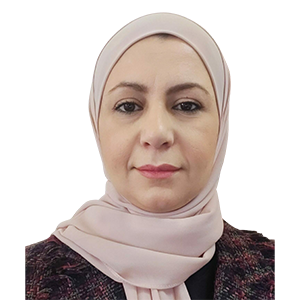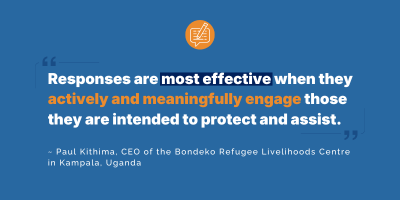Last week, ICVA held a webinar on localisation in Iraq to launch our new report: Measuring Localisation in Iraq’s humanitarian & development landscape report. In this blog, Eman Ismail, ICVA’s MENA Engagement Coordinator reflects on the report findings and the webinar discussion.
For decades, Iraq has endured the devastating impacts of conflict, displacement, and recurring political instability. These challenges have shaped a complex humanitarian and development landscape, demanding continuous adaptation by both international and local actors. As Iraq moves from humanitarian aid to recovery and development, there are real opportunities to shift power and place local actors at the forefront of community-driven rebuilding efforts.
During my time in ICVA, I’ve been privileged to work with our members and partners to define what successful localisation looks like, push boundaries, and foster truly complementary partnership among all actors.
We commissioned this baseline to look at how power and resources are distributed across the humanitarian and development response in Iraq. Using a similar approach to our localisation baselines in Yemen and Ukraine, we worked closely with local actors to adapt global tools – the Localisation Measurement Framework and Tools developed by the Humanitarian Advisory Group and PIANGO – to Iraq’s unique context.
The baseline findings paint a clear picture: While Iraqi NGOs have long played essential roles in delivering aid, overall progress toward truly locally led humanitarian action has been limited. This is despite decades of humanitarian response in the country.
Local and national organisations have played a critical role in reaching communities in need. Iraqi local NGOs have continuously shown resilience in navigating challenges such as limited resources, shrinking civic space, and access to key stakeholders for policy influence and advocacy. They have adapted over time as the context shifted, from humanitarian response to COVID-19 and now toward durable solutions.
And yet they often remain on the periphery of decision-making, coordination, and funding. While local organisations were crucial in accessing remote and insecure areas during past crises, partnerships with international actors have largely remained focused on project implementation, rather than strategic collaboration and genuine partnerships.
The priorities and recommendations from local people and actors continue not to be heard
Despite the importance of local perspectives in shaping humanitarian action, little evidence was found that communities have been consistently involved in evaluating programmes or setting response priorities in line with their needs.
In the policy sphere, local and national actors have similar faced challenges in having their voices heard and policies are occasionally informed by local perspectives. This limited policy influence also extends to donor priorities, and local organisations have little say in funding priorities or programme design.
There are limited examples of contextualised standards, tools, and policies to support national long-term response capacity. This has become a glaring gap given the transition from humanitarian to development and the closure of the clusters and NGO coordination platform.
Funding is a particularly stark indicator of the challenges ahead, and local actors continue to face barriers in accessing direct and more importantly, sufficient funding for delivering their services. Partnerships built among local and international actors achieved progress despite declines in funding, however the funding reductions have led to shrinking avenues for capacity exchange and technical support.
The study underscores that localisation is not only about strengthening the capacity, but also about shifting decision-making power to local actors.
“Strengthening locally led responses is not the responsibility of one actor alone, it demands bold, coordinated partnerships across sectors. From establishing long-term, flexible funding streams for local civil society to building inclusive peace and recovery mechanisms, we must work together to create systems where local leadership is not just supported, but sustained.”
Ismaeel Dawood
Lead author
Localisation is a shared responsibility
The path to more locally led action in Iraq is complex. It will require the collective commitment of all stakeholders, from donors and international organisations to national actors and civil society. International actors will need to invest in building principled partnerships, tailoring support packages and channelling more resources to local NGOs, especially small, grassroots, and women-led organisations. Meaningful progress will depend on creating spaces for dialogue, ensuring that interim to long term goals are met, and using the indicators identified in this study to track progress over time.
At ICVA, we believe that local leadership is a key part of building a more resilient and effective response, transitioning from humanitarian to early recovery toward long term sustainable response.
We are committed to advancing the role of local actors and strengthening their leadership in decision-making, coordination and priority setting. We haven’t waited to act: ICVA are actively supporting local actors through tailored capacity-strengthening programs designed to enhance their coordination effectiveness, leadership skills, and connecting organisations for complementarity. We are also currently working to build a locally led network in Iraq in collaboration with key partners including DRC, PAO, and other NGO actors.
“During the webinar, we heard that many humanitarian networks exist in Iraq, but most are made up solely of local NGOs. What we’re building—with the support and guidance of ICVA—is different: a collective and inclusive space where INGOs and LNGOs co-lead. The Iraqi Localisation Baseline Report gives us the roadmap, and we are shaping the newly established Iraqi Locally-Led Network for Coordination and Cooperation to be the vehicle to move forward—together. This is how we begin to live the vision of being ‘as local as possible, as international as necessary’ in Iraq.”
Noor S. Al-Ibadi
Director, Iraqi Locally-Led Network for Coordination and Cooperation
Resetting the System, Rebalancing the Power
But more is undoubtedly needed: The humanitarian system must fundamentally shift from top-down aid delivery to locally led solutions to improve both responsiveness and sustainability. This message is not new. It has been consistently emphasised across localisation policies, initiatives and reviews.
Localisation has also been affirmed as a core priority of the Humanitarian Reset, which explicitly calls for a meaningful transfer of power to local actors. This requires more than resources, it will mean redefining partnerships on more equitable terms and dismantling structural barriers. It will also require leveraging and bringing together actors across the Humanitarian-Development-Peace nexus to sustain and expand localisation gains.
Furthermore, to demonstrate solidarity, INGOs should join forces with local and national entities to influence decision-making processes and achieve positive outcomes for civic space and create the enabling environment for local actors to achieve their mission. This will also show INGOs are willing to work in a complementary and principled way with all counterparts.
And finally, we must move beyond rhetoric by systematically measuring progress and using these results to collectively develop actionable plans, this is precisely why establishing a clear localisation baseline remains so important for translating commitments into tangible change.
The localisation journey in Iraq is far from over. The enthusiasm and resilience of local actors has been profoundly inspiring, despite all the challenges they face. With shared commitment, we can ensure the next chapter of this journey is written by those who have lived every page of it.
Read the report here:
Measuring Localisation in Iraq’s humanitarian & development landscape report.











